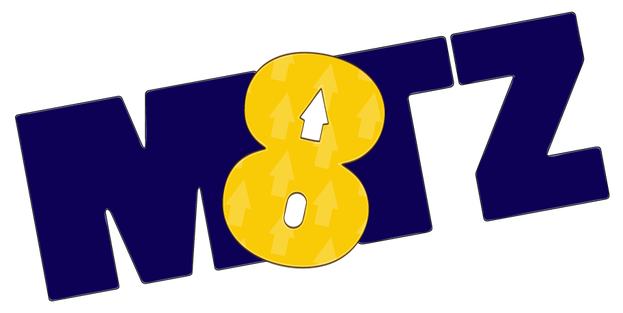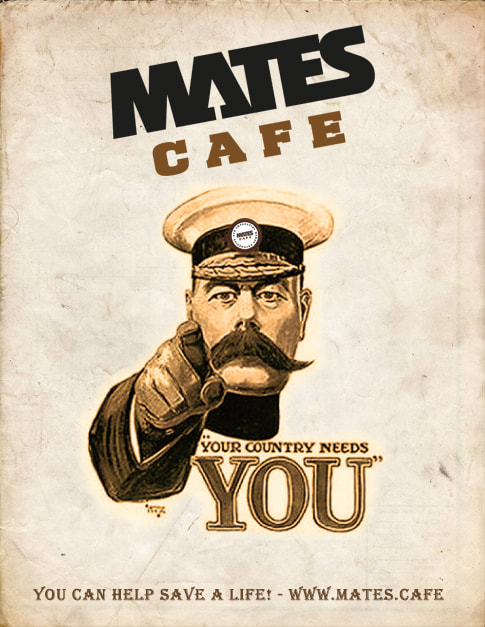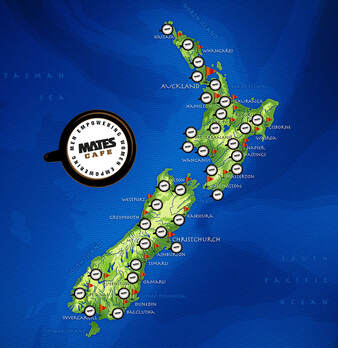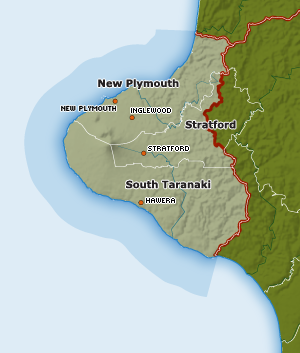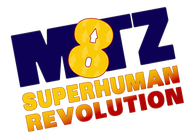You Are Not Alone - MATES Cafe Taranaki NZ
MATES Cafe is a network of everyday people of all cultures and ethnicity (including teens, elders and lgbt+) who are trained to meet with a person in crisis or isolation at a local cafe, and provide emotional support and encouragement.
MATES Cafe will empower your life so you can in turn empower the lives of others in need.
MATES are here:
To help people of all ages, gender, culture, ethnicity and personal beliefs through the challenges and tough times of life including relationship breakdown, depression, anxiety, loss and grief, bullying, loneliness and isolation. MATES are trained to be there for someone in need and helping them through a point of crisis in their life. It's not about therapy, fixing or giving advice, just simply listening and helping them to find new direction in their life.
Taranaki NZ - MATES Cafe Network
|
A Call-Out to ALL!
Can You Spare ONE Hour of Your Life to Save a Life? MATES Cafe is purely about saving lives. Do you realise one person completes suicide every 13 hours in New Zealand because they are unable to stand the emotional trauma they are undergoing, often caused by relationship breakdown. Every 4 minutes 1 New Zealander has suicidal thoughts and needs a MATE to turn to. MATES need your help to drastically lower the suicide rate... are you with us? Saving someones life can be to either:
|
Support Services in Taranaki
LifeLine New Zealand Last updated 06/06/2013 LifeLine is here to listen to the unheard, to empower the caller to retake control of their situation, making callers aware of options rather than offering advice.
This provider offers a national helpline service.
- [email protected]
- (0800) 543 354
- (0800) LIFELINE
- http://www.lifeline.co.nz
- Availability: 24 hours a day, seven days a week.
- Charges: All services free of charge.
- Referrals: No referral required.
This provider offers a national helpline service.
- [email protected]
- (0800) 111 757
- http://www.depression.org.nz
- Availability: Helpline is available 8am to midnight daily. Website is available 24 hours a day, seven days a week.
- Charges: All services free of charge.
- Referrals: No referral required.
- [email protected]
- (06) 757 9300
- (021) 733 816
- Level 3, Devon Centre
- 44 Liardet Street
- New Plymouth
- Availability: Monday - Friday: 9am - 5pm
- Charges: All services free of charge.
- Referrals: No referral required.
- [email protected]
- (0800) 54 33 54
- (06) 757 9493
- http://www.lifeline.co.nz
- Availability: Tuesday, Wednesday, Thursday
- Charges: All services free of charge.
- Referrals: No referral required.
- [email protected]
- (06) 769 5553
- (0800) 827 973
- http://www.womensrefuge.org.nz
- Level 2, Kings Building
- 36 Devon Street West
- New Plymouth
- 4340
- Availability: 24 hours (Support Crisis phone line). Community Office: Mon-Friday 9am-3pm
- Charges: All services free of charge.
- Referrals: No referral required.
- [email protected]
- (0800) VICTIM
- (0800) 842 846
- http://www.victimsupport.org.nz
- Availability: The Victim Support Service is available 24 hours, 7 days a week.
- Charges: All services free of charge.
- Referrals: No referral required.
- [email protected]
- (0800) VICTIM
- (0800) 842 846
- http://www.victimsupport.org.nz
- Availability: The Victim Support Service is available 24 hours, 7 days a week.
- Charges: All services free of charge.
- Referrals: No referral required.
- [email protected]
- (0800) VICTIM
- (0800) 842 846
- http://www.victimsupport.org.nz
- Availability: The Victim Support Service is available 24 hours, 7 days a week.
- Charges: All services free of charge.
- Referrals: No referral required.
- [email protected]
- (06) 278 6399
- Summit House
- 6 Furlong Street
- Hawera
- 4610
- Availability: HRC Family Counselling Services is open three day a week - Tuesday, Wednesday and Thursday - from 9am to 3pm.
- Charges: Some charges may apply.
- Referrals: No referral required.
SHINE: Safer Homes In New Zealand Everyday Inc Last updated 04/10/2012 Shine (Safer Homes In New Zealand Everyday) is making homes violence free. Shine offers a free national Helpline and a number of innovative services that work to stop domestic abuse.
This provider offers a national helpline service. Approved Family Violence Provider
- [email protected]
- (0508) 744 633
- (09) 815 4601
- http://www.2shine.org.nz
- Ground Floor
- 409 New North Road
- Kingsland
- Auckland
- Availability: Helpline ( 0508 744 633 ) is answered 9am - 11pm, 7 days a week . Our office hours are 8.30am - 5.00pm weekdays.
- Charges: Some charges may apply.
- Referrals: Referral may apply.
Approved Family Violence Provider
- (06) 758 3666 x 0
- http://npymca.org.nz
- 83 Liardet Street
- New Plymouth
- Availability:
- Charges: All services free of charge.
- Referrals: Referral may apply.
- [email protected]
- (06) 753 7777 extn 8862
- http://www.tdhb.org.nz/services/public_health/health_promotion.shtml
- Public Health Unit - Lvl 2, Barrett Building
- - Tukapa Street
- Westown
- New Plymouth
- 4310
- Availability: Monday to Friday: 8.00am - 4.30pm
- Charges: All services free of charge.
- Referrals: No referral required.
- (06) 756 8242
- http://www.oa.org
- Taranaki Cathedral - Quiet Room
- 37 Vivian Street
- New Plymouth
- 4330
- Availability: Meets Friday at 09:30 AM
- Charges: All services free of charge.
- Referrals: No referral required.
- [email protected]
- (06) 757 3006
- http://www.taranakicancersociety.org.nz
- TSB Cancer Support Centre
- 71 Lorna Street
- Westown
- New Plymouth
- 4310
- Availability: 9am - 3.30pm weekdays
- Charges: All services free of charge.
- Referrals: No referral required.
Approved Family Violence Provider
- [email protected]
- (06) 758 5795
- 62 Powderham Street
- New Plymouth
- Availability: 8.30am - 4.30pm and by arrangement.
- Charges: All services free of charge.
- Referrals: Referral may apply.
Need Further Support - Click Here
Information about Taranaki
Number of people counted
Total population
Number of dwellings counted
Total population
- 104,127 people usually live in Taranaki Region. This is an increase of 1,269 people, or 1.2 percent, since the 2001 Census.
- Its population ranks 10th in size out of the 16 regions in New Zealand.
- Taranaki Region has 2.6 percent of New Zealand's population.
- Male 51,144 1,965,618
- Female 52,980 2,062,329
- Total 104,127 4,027,947
- 15,801 Māori usually live in Taranaki Region, an increase of 1,242 people, or 8.5 percent, since the 2001 Census.
- Its Māori population ranks 10th in size out of the 16 regions in New Zealand.
- 2.8 percent of New Zealand's Māori population usually live in Taranaki Region.
- Male 8,004 274,860
- Female 7,794 290,466
- Total 15,798 565,329
Number of dwellings counted
- There are 40,461 occupied dwellings and 3,363 unoccupied dwellings in Taranaki Region.
- For New Zealand as a whole, there are 1,478,709 occupied dwellings and 159,273 unoccupied dwellings.
- There are 351 dwellings under construction in Taranaki Region, compared with 13,560 under construction throughout New Zealand.
- Occupied Private dwelling 40,281 1,471,746
- Non-private dwelling 183 6,963
- Total 40,461 1,478,709
- Unoccupied 3,363 159,273
- Under construction 351 13,560
- Total 44,175 1,651,542
Taranaki Region
Taranaki is a region in the west of New Zealand's North Island and is the 10th largest region of New Zealand by population.[2] It is named for the region's main geographical feature, Mount Taranaki.
The main centre of the Taranaki region is the city of New Plymouth which has been voted the "Top City" in New Zealand. The New Plymouth District has over 60% of the entire population of Taranaki.[3] New Plymouth is located in North Taranaki along with Inglewood and Waitara. South Taranaki towns include Hawera, Stratford and Eltham.
Since 2005, Taranaki has used the promotional brand "Like no other".[4]
Geography and people A map showing population density in the Taranaki Region at the 2006 census. Taranaki is situated on the west coast of the North Island, surrounding the volcanic peak. The large bays north-west and south-west of Cape Egmont are prosaically named the North Taranaki Bight and the South Taranaki Bight.
Satellite picture of Mount Taranaki or Mount Egmont, from the NASA Earth Observatory, showing the nearly-circular Egmont National Park surrounding it. The city of New Plymouth is the grey area on the northern coast. Mount Taranaki, or Mount Egmont--Te Maunga O Taranaki in Māori—is the dominant feature of the region, second-tallest mountain in the North Island. Māori legend says that Taranaki previously lived with the Tongariro, Ngauruhoe and Ruapehu mountains of the central North Island but fled to its current location after a battle with Tongariro.
Taranaki, a near-perfect cone, last erupted in the mid-18th century. The mountain and its immediate surrounds form Egmont National Park.
Although Māori had called the mountain Taranaki for many centuries, Captain James Cook renamed it Egmont after the Earl of Egmont the recently retired First Lord of the Admiralty who had encouraged his expedition. The mountain has two alternative official names, "Mount Taranaki" and "Mount Egmont".[5]
The region has an area of 7258 km² and a population of 109,700 (June 2011 estimate).[1] Just under half live in the city of New Plymouth. Other centres include Waitara, Inglewood, Stratford, Opunake, Okato, Kaponga, Eltham, Hawera, Patea and Waverley—the southern-most town.
The region has had a strong Māori presence for centuries. The local iwi (tribes) include Ngāti Mutunga, Ngāti Maru, Ngāti Ruanui, Taranaki, Te Āti Awa, Nga Rauru, Ngāruahinerangi and Ngāti Tama.
View of Mount Taranaki or Mount Egmont from Stratford, facing west. Fanthams Peak is to the left of the main peak. Note the cow in the foreground, Taranaki is a major dairying region. The region is exceptionally fertile, thanks to generous rainfall and the rich volcanic soil. Dairy farming predominates, with the milk factory just outside Hawera being the second largest in the Southern Hemisphere. There are also oil and gas deposits in the region, both on- and off-shore. The Maui gas field off the south-west coast has provided most of New Zealand's gas supply as well as, at one time supporting two methanol plants (one formerly a synthetic-petrol plant called the Gas-To-Gasolene plant) at Motunui. More fuel and fertilizer is produced from a well-complex at Kapuni and a number of smaller land-based oilfields. With the Maui field nearing depletion, new offshore resources have been developed: The Tui field, 50 km south of Hawera, with reserves of 50,000,000 barrels (7,900,000 m3) of oil[6] and the Pohokura gas field, 4.5 km north of Waitara.[7]
The way the land mass projects into the Tasman Sea with northerly, westerly and southerly exposures results in many excellent surfing and windsurfing locations, some of them considered world-class.
Economy The sub-national GDP of the Taranaki region was estimated at US$4.4 billion in 2003, 3% of New Zealand's national GDP.[8]
History The area became home to a number of Māori tribes from the 13th century. From about 1823 the Māori began having contact with European whalers as well as traders who arrived by schooner to buy flax.[9] In March 1828 Richard "Dicky" Barrett (1807–47) set up a trading post at Ngamotu (present-day New Plymouth).[10] Barrett and his companions, who were armed with muskets and cannon, were welcomed by the Āti Awa tribe because of their worth assisting in their continuing wars with Waikato Māori, .[10] Following a bloody encounter at Ngamotu in 1832, most of the 2000 Āti Awa [10] living near Ngamotu, as well as Barrett, migrated south to the Kapiti region and Marlborough.
In late 1839 Barrett returned to Taranaki to act as a purchasing agent for the New Zealand Company, which had already begun on-selling the land to prospective settlers in England with the expectation of securing its title. Barrett claimed to have negotiated the purchase of an area extending from Mokau to Cape Egmont, and inland to the upper reaches of the Whanganui River including Mt Taranaki. A later deed of sale included New Plymouth and all the coastal lands of North Taranaki, including Waitara.
European settlement at New Plymouth began with the arrival of the William Bryan in March 1841.In mid 1842 the whole of North Taranaki,northward of Cape Egmont, was sold to the government by Te Wherowhero the great Waikato chief,(who later became the first Maori King) who had conquered the land to establish his mana. The land was sold for 250 pounds,2 horses, 2 saddles,2 bridles and 100 blankets.The deed of sale was written in both English and Maori and included Waitara. European expansion beyond New Plymouth, however, was prevented by some Māori opposition to selling their land, a sentiment that deepened as links strengthened with the King Movement. Tension over land ownership continued to mount, leading to the outbreak of war at Waitara in March 1860. Although the sale of the Waitara block resulted from the offer of a minor chief to sell his land, the greater issue fuelling the conflict was the Government's desire to impose British sovereignty in the form of administration, law and civilisation on the Māori.[11]
The war in Taranaki was fought by more than 3500 imperial troops brought in from Australia, as well as volunteer soldiers and militia, against Māori forces that fluctuated between a few hundred and about 1500.[12] Total losses among the imperial, volunteer and militia troops are estimated to have been 238, while Māori casualties totalled about 200.
An uneasy truce was negotiated a year later, only to be broken in April 1863 as tensions over land occupation boiled over again. A total of 5000 troops fought in the Second Taranaki War against about 1500 men, women and children. The style of warfare differed markedly from that of the 1860–61 conflict as the army systematically took possession of Māori land by driving off the inhabitants, adopting a "scorched earth" strategy of laying waste to the villages and cultivations of Māori, whether warlike or otherwise. As the troops advanced, the Government built an expanding line of redoubts, behind which settlers built homes and developed farms. The effect was a creeping confiscation of almost a million acres (4,000 km²) of land.[13]
The present main highway on the inland side of Mount Taranaki follows the path taken by the colonial forces under Major General Trevor Chute as they marched, with great difficulty, from Patea to New Plymouth in 1866.
Armed Māori resistance continued in South Taranaki until early 1869, led by the warrior Titokowaru, who reclaimed land almost as far south as Wanganui. A decade later spiritual leader Te Whiti o Rongomai, based at Parihaka, launched a campaign of passive resistance against government land confiscation, which culminated in a brutal raid by colonial troops on 5 November 1881.
The confiscations, subsequently acknowledged by the New Zealand Government as unjust and illegal,[14] began in 1865 and soon included the entire Taranaki district. Towns including Normanby, Hawera and Carlyle (Patea) were established on land confiscated as military settlements.[15] The release of a Waitangi Tribunal report on the situation in 1996 led to some debate on the matter. In a speech to a group of psychologists, Associate Minister of Māori Affairs Tariana Turia compared the suppression of Taranaki Māori to the Holocaust, provoking a vigorous reaction[16] around New Zealand, with Prime Minister Helen Clark among those voicing criticism.
Governance Provincial Government From 1853 the Taranaki region was governed as the Taranaki Province, (initially known as the New Plymouth Province) until the abolition of New Zealand provinces in 1876. The leading office was that of the superintendent.
The following is a list of superintendents of the Province of Taranaki during this time:
Superintendent Term Charles Brown 1853–1857 George Cutfield 1857–1861 Charles Brown 1861–1865 Henry Robert Richmond 1865–1869 Frederic Alonzo Carrington 1869–1876 Taranaki Regional Council The Taranaki Regional Council was formed as part of major nationwide local government reforms in November 1989, for the purpose of Integrated catchment management. The regional council was the successor to the Taranaki Catchment Board, the Taranaki United Council, the Taranaki Harbours Board, and 16 small special-purpose local bodies that were abolished under the Local Government Amendment Act (No 3) 1988. The Council's headquarters were established in the central location of Stratford to "provide a good compromise in respect of overcoming traditional south vs north Taranaki community of interest conflicts" (Taranaki Regional Council, 2001 p. 6).
Functions The Council operates under the Resource Management Act mandate of sustainable management, and carries out the following functions:
- Policy and planning
- Civil defence emergency management
- Resource consents
- Land management
- River control and flood protection
- Land transport and harbour management
- Resource investigations, monitoring and enhancement
- Pest management
- Recreation, culture and heritage
- Regional representation, information and investments
- Ross Leslie Allen (1989–2001)
- David Walter (2001–2007)
- David MacLeod (2007–)
Notable people
- Sir Peter Buck (Te Rangi Hīroa) of Ngāti Mutunga – Māori scholar, born in Urenui
- Michael Campbell – golfer
- William Douglas Cook (New Plymouth, 1884 – Gisborne, 1967) – founder of Eastwoodhill Arboretum, Ngatapa, Gisborne and of Pukeiti, world famous rhododendron garden, New Plymouth.
- Grant Fox – Former All Black fly-half, born in New Plymouth
- Paige Hareb – professional surfer
- Graham Kirk – artist
- Len Lye – artist, filmmaker Born in Christchurch, collection only housed in New Plymouth.
- Melanie Lynskey – actress
- Luke McAlister – New Zealand All Blacks
- Graham Mourie – former All Black captain
- William Malone – First World War officer
- Darcy Nicholas – artist[17]
- Conrad Smith – Current All Black centre, born in Hawera and went to Francis Douglas Memorial College
- Michael Smither – artist
- Peter Snell – Gold medal winning athlete, born in Opunake
- Ronald Syme – scholar of ancient history
- Isaac Luke – South Sydney Rabbitohs and New Zealand rugby league international
Realizing our full human potential... Imagine what we can achieve together!
M8TZ - Recreating Community: Worldwide | New Zealand | Australia | United States | United Kingdom | China | Canada | India
Refer Someone | Consultations | Contact M8TZ Cafe: | Policies | © MATES 2023 All rights reserved.
Refer Someone | Consultations | Contact M8TZ Cafe: | Policies | © MATES 2023 All rights reserved.
